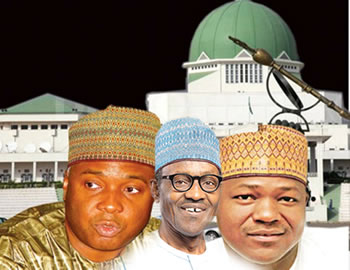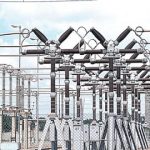The leadership of the National Assembly (NASS) recently gave notice of very deep disagreement with the Executive arm of government in Nigeria against the background of the decision of the office of the Attorney-General of the Federation (AGF) to proceed with charging the President and the Deputy President of the Senate, alongside some others, with the crime of illegally altering the Senate Standing Order. The leadership of the National Assembly was clear in categorising this criminal charge as an attempt to remove through the back door, the two principal officers of the Senate with a view to procuring more amenable persons for the two positions. This is especially, according to the NASS leadership, because the issue of alteration of the Senate Standing Order is part of the internal affairs of the Senate that would not need or require the intervention of the executive.
It further contended that this issue had been raised and ruled upon on the floor of the Senate, and that it was surprising that the same issue could attract the attention of the executive when it should be clear that no issue resolved on the floor of the Senate ought to be canvassed again in any court of law or outside of the Chamber. As far as the leadership of the National Assembly was concerned, the criminal charge against the President and Deputy President of the Senate was done in bad faith and it would signal appropriate reaction from the legislative arm of government. However, the two principal officers of the National Assembly have since been arraigned in court and granted bail.
The Attorney General of the Federation, Mr Abubakar Malami (SAN), has since responded to the position of the NASS by insisting that the preferment of criminal charges against the President and Deputy President of the Senate was the outcome of a normal police investigation which concluded that a crime had been committed with the necessary implication of taking the case to the court in that regard. He saw nothing wrong in the Senate President and the Deputy Senate President utilising the opportunity provided by the court trial to prove their innocence as the court would have a final decision on the guilt or otherwise in the case. We see the logic in the AGF’s response especially as it could not be disputed that it would pass as part of the normal duties of his office to recommend what cases should go on trial and it would be remiss to argue that cases involving members of the National Assembly should be treated with different yardsticks. In any case, both the police and the AGF’s office would have nothing to do with the case if it had not come as a complaint to the police from a group of senators, suggesting that what is at the basis of the case is a disagreement among senators which the leadership of the National Assembly should also look into.
Whereas the fact that some senators are not satisfied with the running of the affairs of the National Assembly by the current leadership should not be a valid basis for preferment of cases against officers of the National Assembly, it is still important to note the discord in the Assembly as it would be difficult for the executive to have a basis for such intervention without the prevailing discord. This is not to gloss over the possibility that the group of dissatisfied senators could also be acting under outside influence or deliberately to get the current outcome.
Nonetheless, the point still has to be made that the public spat on this issue between the NASS and the Presidency speaks to the absence of the needed relationship and cooperation between these two arms of government. To be sure, the whole essence of separation of powers among the three arms of government is to provide checks and balances in the functioning of government with each concentrating on its allotted functions. But this should not be to the extent of not working together, as it is only through cooperation among the three arms that the government could function well and run effectively and efficiently. It is in this sense that any real chasm between the arms would work to the disadvantage of the whole government, such that processes for interaction and intergovernmental cooperation are almost always important and treated with utmost necessity. This is why the current growing rift between the executive and the legislature should be viewed as a negative development that should be immediately and urgently addressed in order for it not to persist and fester.
There should be a reopening of communication between the two arms of government in order to settle issues of contention in an atmosphere of working together for the good of all. There is nothing to be gained in each of the arms trying to publicly cudgel or discredit the other. Rather, there is much to be gained when they work together in the spirit of mutual respect for the progress and development of the country. This is what the current tense and difficult situation in the country demands and this is what would demonstrate that officials in the two arms place the national and collective interest above personal and divisive interests.
WATCH TOP VIDEOS FROM NIGERIAN TRIBUNE TV
- Let’s Talk About SELF-AWARENESS
- Is Your Confidence Mistaken for Pride? Let’s talk about it
- Is Etiquette About Perfection…Or Just Not Being Rude?
- Top Psychologist Reveal 3 Signs You’re Struggling With Imposter Syndrome
- Do You Pick Up Work-Related Calls at Midnight or Never? Let’s Talk About Boundaries







